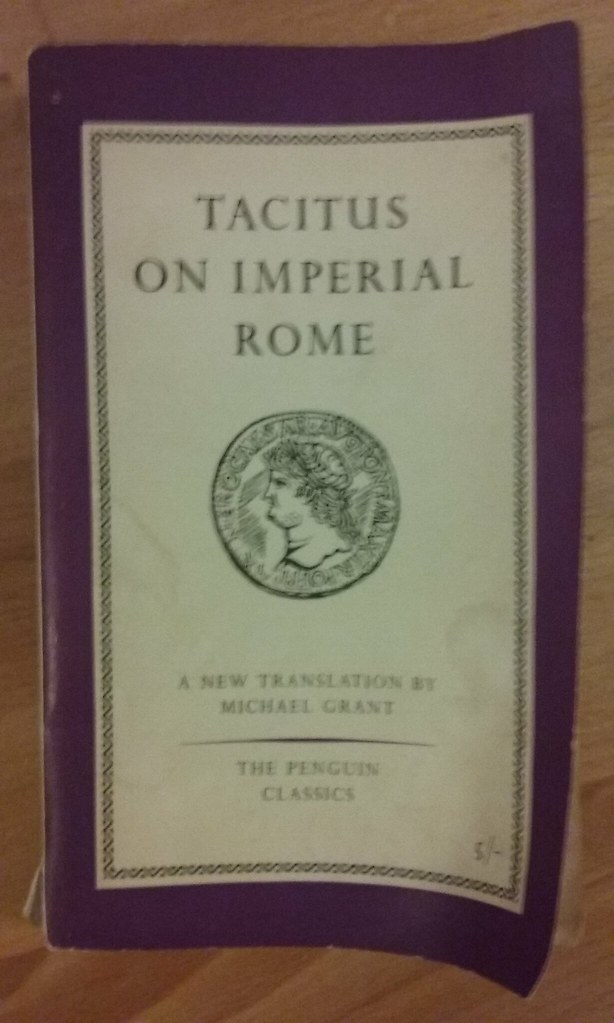 Tacitus on Imperial Rome (wiki) also known as the Annals or similar is a history of the Roman Empire from the reign of Tiberius to that of Nero, the years AD 14–68.
Tacitus on Imperial Rome (wiki) also known as the Annals or similar is a history of the Roman Empire from the reign of Tiberius to that of Nero, the years AD 14–68.I picked up my copy second hand after finding the phrase corruptissima re publica plurimae leges, or "the more numerous the laws, the more corrupt the government"; although in the edition I read, it is translated as "corruption reached its climax, and legislation abounded". Which is the other way around. Never mind, it was a concept I was interested in - see that post - and it was enough to make me get the book.
To some extent I was disappointed; it is not, as I had half thought, a collection of aphorisms. Much of it is a rather dry recitation of history, much of which was, apparently, gathered from the records of the senate. What excitement there is comes from the underlying subject, which is a mixture of Imperial Rome doing stuff (conquering, ruling, whatever; see below) and the political machinations at Rome, much of which in the later parts is the hideous corruption and cruelty of the emperors. The death of Livia is touchingly told.
Of the "Imperial Rome doing stuff" there are things of interest. Mostly, as usual, upsetting my ideas of what it was they did. Quite a lot seems taken up by Rome, as a patient but not inexhaustibly so paternal figure, keeping the peace amongst the warring and nominally conquered tribes of Armenia, or Germany. Britain gets a brief mention. Egypt was the breadbasket of the Empire, and at some point is rather casually converted from subject nation to province. None of this seems to greatly trouble the power of the Imperium.
Of the corruption at Rome: this is all rather more familiar stuff. It is hard to pick out the more relevant bits; but it is all too familiar in the cases of Nazi Germany; or Iraq; or Gaddafi's Libya. In that taking down a tyrant is risky, so people don't, so they get killed anyway. But the tyrant is always uneasy; which provokes yet more paranoid culling of prospective rivals, which generates yet more unrest. And the populace has to be fed, and there needs to be some money in the treasury to bribe the populace with.
Many of their customs appear bizarre. People, when accused before the senate often implausibly, choose suicide over trial; generally by "opening their veins", though this is generally described as a painful slow death. The Papian Poppaean law prohibited celibacy; you would be preferred in the senate if you had more children; and so on. Shades of the "decline of the West" we hear in our society? "It had failed, however, to popularise marriage: childlessness was too attractive". But why?
Page 129 in my edition - its just before, well includes, the quote re abundance of laws and corruption - is a sort of idealised history of the process of law formation, which Tacitus mostly bemoans. But what it speaks to is the way that Rome never really found itself a stable constitution or proper set of legal principles. That's especially obvious during the period that the book covers. As I understand it, Tiberius ruled as Emperor, but with no legal backing. Formally, he ruled through the senate. And from reading the book, I get the impression it was a mixture of him wishing they would do more - he frequently leaves things up to them - and doing things because they're incapable of handling them. But, he had the power.
Tacitus doesn't much like Tiberius but he was at least competent, as far as I can see. And perhaps sufficiently secure not to need to brutalise his people. In subsequent emperors, that fails.
Part of the subsequent-emperor problem, and the lack of legal basis, and the longing for the olde dayes, seems to be tied up with Imperial Rome actually being a rather small place. I don't actually know how big it was, but the reason it seems small is that everyone is there. Being exiled is a severe punishment. Despite the carnage in Rome, very few people seem to run away to safety in the provinces.
But as I say, there is so much I can't understand. One of the principle perquisites of some class was a better seat in the colosseum. Really? That seems so petty. Unless they were really status-obsessed. Like I say, I just don't understand.
A folded down page: Nero punished the "notoriously depraved Christians... the deadly superstition had broken out afresh... in Rome. All degraded and shameful practices collect and flourish in the capital".
Another: after a foolish commander botches Corbulo's war in Armenia, there is no victory only peace: "At Rome, however, trophies and arches for victory over Parthia were erected... voted by the senate while the war was undecided they were not now abandoned. Known facts were ignored in favour of appearances".
No comments:
Post a Comment